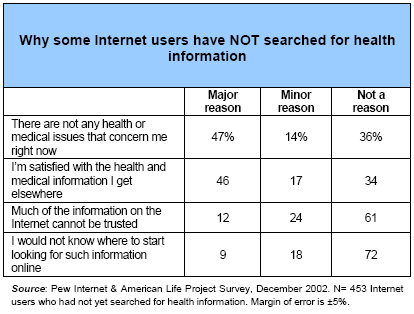I recently received the following email from someone who runs a health information website:
I am wondering if you have any data – or have come across any data – on how closely, or not, online healthcare information seekers reflect their offline counterparts? So, for example, do 80% of non-internet users seek healthcare information from offline sources? I think this kind of comparison would be interesting, if only to show – and I am guessing here – that the convenience of the internet leads more people to seek the information they need.
The question arose this afternoon as I re-read your February report on the results of last year’s survey. As I ponder how to reach offline users with our content, I am asking myself whether those offline users are as hungry for the information we have to offer. Any thoughts?
First, I want to thank everyone who reads our reports and then contacts us for more information. Big points.
Second, I appreciate the thoughtfulness of the question. It inspired me to dig into the Pew Internet archives and draw new connections between our past and present research.
Here’s my answer:
I chose to write profiles of health information seekers for our February 2011 report, Health Topics, but of course the data could be flipped around, ie, profiles of who’s NOT going online for health advice and info. Age and education are the most significant predictors of internet access, followed by health and disability status (please note we have tested each of these in isolation using regression analysis).
Education continues to work its influence when we look at online health information seeking. For example, when looking at adults who have less than a high school education, just 38% go online and, of those, 62% say they gather health information online. That means three-quarters of U.S. adults who have less than a high school education say they do not get health information online. By comparison, college graduates are nearly all online (91%) and 89% of that group gathers health information online. That means only about 20% of U.S. adults with a college degree say they do not get health information online. Please see:
Internet access drives information access.
By contrast, once someone living with a chronic condition has internet access, they are just as likely as everyone else to seek health information online.
I wonder if you’ve had a chance to read our May 2011 report, The Social Life of Health Information, 2011, which includes a few questions that sought to portray people’s real-world information choices, a more 360-degree view, not just an online view. We found that health professionals and offline resources remain central to most adults with health questions, but online social tools are a significant supplement.
Regarding your other question — why aren’t some people going online to get health information? In 2002, we asked a basic screening question to determine if the respondent ever uses the internet to look for health or medical advice or information. Those who did not were asked a follow-up series to determine why they do not go online for health information.
Here is a chart with the details:

Here is a link to the 2003 report, Internet Health Resources, which links to the survey questions and data set, in case you want to dig into the data yourself.
We should probably repeat that question now that internet access is more universal, particularly with the rise of mobile access, but I think it’s still a good clue.
You might also be interested in some of the ideas and data points I included in a recent speech, Peer-to-peer Healthcare, particularly the section on “roadblocks and opportunities.”
(Update: Thanks to George Linzer of LabTestsOnline for the great questions!)




